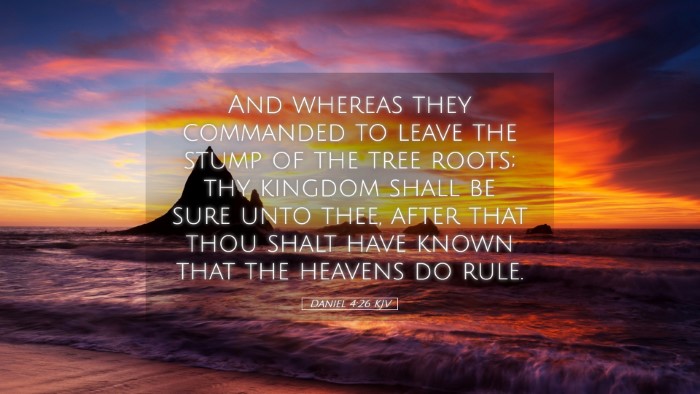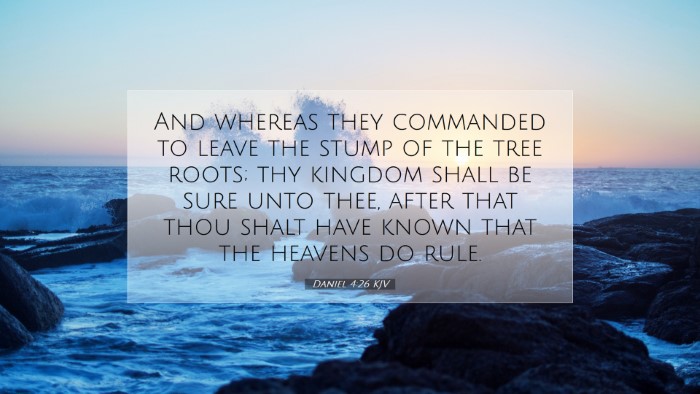Commentary on Daniel 4:26
Verse: "And whereas they commanded to leave the stump of the tree roots; thy kingdom shall be sure unto thee, after that thou shalt have known that the heavens do rule."
Introduction
This verse is part of a larger narrative concerning Nebuchadnezzar and his dream, symbolizing the rise and fall of empires and the divine sovereignty over human affairs. The imagery of the tree, a common biblical metaphor for prosperity and stability, serves to illustrate God's governance.
Historical Context
Daniel 4 is unique as it features a first-person account from King Nebuchadnezzar himself. The chapter reflects his transformation from pride to humility, recognizing the ultimate authority of God over all kingdoms. The ‘stump of the tree’ symbolizes a remnant of power and a future restoration after a period of divine discipline.
Commentary Insights
Matthew Henry's Perspectives
Henry emphasizes the mercy of God in leaving the stump, indicating that although Nebuchadnezzar would face punishment, God intended to restore him. This serves as a reminder that God's judgment is not without compassion; He offers a path to redemption even after severe consequences. The “stump” becomes a symbol of hope for future restoration, as noted in Henry's writing.
Albert Barnes' Analysis
Barnes highlights the significance of divine authority over earthly kingdoms. The phrase "the heavens do rule" reflects the overarching truth that God's sovereignty is paramount. Barnes asserts that the command to leave the stump represents a promise that, despite the king's impending humiliation, his throne would not be completely destroyed. Such assurance implies that God's governance includes both judgment and grace.
Adam Clarke's Interpretation
Clarke notes the theological implications of the ‘stump’ in relation to the divine providence. He explores the narrative's focus on the necessity of recognizing God’s sovereignty. Clarke elaborates that understanding one’s place in relation to divine governance fosters humility and reverence toward God. This recognition of God's rightful rule is essential to the restoration of Nebuchadnezzar’s sanity and kingdom.
Theological Implications
This verse serves as a profound reminder to theologians and pastors alike of the central tenet of divine sovereignty. It illustrates that human pride can lead to temporary judgment, yet God’s grace enables restoration.
- Divine Sovereignty: The assertion that "the heavens do rule" speaks volumes about the nature of God's authority over all creation.
- Human Pride: Nebuchadnezzar's pride led to his downfall, indicating the dangers of self-exaltation.
- Restoration through Humility: The stump signifies hope; recognizing God’s supremacy is essential for personal and communal restoration.
Application for Today
This passage challenges modern readers to reflect on their relationship with God. In a world rife with pride and self-sufficiency, Daniel 4:26 calls for humility and recognition of God’s ruling hand over all circumstances.
For Pastors:
Pastors can draw on this narrative to communicate the balance between God's justice and mercy. Encouraging congregants to acknowledge their dependence on divine authority, particularly in the face of societal pressures, is vital.
For Theologians:
Theologians are invited to explore the implications of divine sovereignty as reflected in this text, understanding how it parallels other scriptural themes of judgment and grace throughout the Old and New Testaments.
For Students:
Students of the Bible can analyze how the symbolism of the tree and its stump manifests throughout scripture, exploring themes of restoration and the continuity of God's plan in the broader narrative of redemptive history.
Conclusion
In summary, Daniel 4:26 encapsulates a profound truth about God’s relationship with mankind—His governance, the repercussions of human pride, and the path to restoration through humility. The narrative of Nebuchadnezzar serves as a lesson for all, highlighting the necessity of acknowledging that the heavens indeed rule, and in that acknowledgment lies the path to peace, restoration, and a right understanding of one's place in God's creation.


